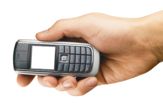Why Cell Phones Should be Allowed in Hospitals

The prohibition against mobile phones in hospitals may do more harm than good, a new report reveals.
Medical facilities prohibit cell phone use, but some doctors already use them. And it turns out they reduce medical errors because communication is more timely, a new study finds.
Mobile phones rarely cause electronic magnetic interference, Yale School of Medicine researchers reported today.
The study is published in the February issue of Anesthesia & Analgesia. It was based on 4,018 responses from attendees at the 2003 meeting of the American Society of Anesthesiologists.
Of those who responded, 65 percent reported using pagers as their primary mode of communications, and of those, 40 percent reported delays in communications.
Of the 17 percent of respondents who said they used cell phones, only 31 percent reported delays.
No word how the patients involved in all those delays fared. But some good news:
Get the world’s most fascinating discoveries delivered straight to your inbox.
Study leader Keith Ruskin, associate professor in the Departments of Anesthesiology and Neurosurgery, said electronic interference from cell phones is a thing of the past.
"The new digital cell phones used much higher power and operate at a different frequency," Ruskin said. "The small risks of electromagnetic interference between mobile telephones and medical devices should be weighed against the potential benefits of improved communication."
So there's this tradeoff:
Ruskin said the 2.4 percent prevalence of electronic interference with life support devices such as ventilators, intravenous infusion pumps, and monitoring equipment should be weighed against the known 14.9 percent risk of medical error or injury due to communication delays.
A decision for those who run hospitals but not for the impatient cell phone user in a waiting room.
Robert is an independent health and science journalist and writer based in Phoenix, Arizona. He is a former editor-in-chief of Live Science with over 20 years of experience as a reporter and editor. He has worked on websites such as Space.com and Tom's Guide, and is a contributor on Medium, covering how we age and how to optimize the mind and body through time. He has a journalism degree from Humboldt State University in California.



